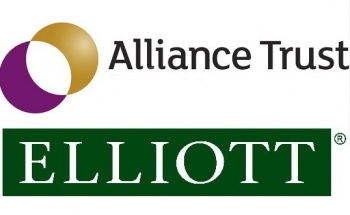The board of Alliance Trust plc has agreed to buy out the 19.75% stake of Elliott Advisors, the US activist investor that has successfully pushed through a raft of management and structural changes at the FTSE 250 asset manager in recent years:
- 2010: Elliott sets its sights on Alliance, citing poor performance, high costs and lossmaking subsidiaries (shares then trading at a 15% discount to net asset value)
- 2011-14: Elliott continues to increase its shareholding incrementally
- 2015: Elliott’s campaign intensifies, ultimately leading to the departure of then-CEO Katherine Garrett-Cox and the appointments of two NEDs nominated by Elliott
- 2016: Alliance announces the sale of its investment management arm and the outsourcing of its equity portfolio to other managers
- 2017: Alliance confirms it will repurchase Elliott’s 19.75% shareholding as part of a wider buyback programme (shares now trading at a 5% discount to net asset value)
 Back in 2011, Elliott reportedly claimed that its then-3% stake in Alliance was “not an activist position”; at the time, the trust was already embroiled in a separate dispute with hedge fund Laxey Partners, which was seeking a share buyback programme to address the NAV discount. However as Elliott’s stake increased over the years, so did its public interest in how the trust was being run.
Back in 2011, Elliott reportedly claimed that its then-3% stake in Alliance was “not an activist position”; at the time, the trust was already embroiled in a separate dispute with hedge fund Laxey Partners, which was seeking a share buyback programme to address the NAV discount. However as Elliott’s stake increased over the years, so did its public interest in how the trust was being run.
Undoubtedly aware of its reputation as an aggressive “mercenary”, and perhaps cognisant of cultural differences between the US and UK, Elliott’s campaign has been notable for its relatively measured and systematic approach. It was this approach that won the activist broad support among the retail investors that comprise 70% of Alliance’s shareholder base, and ultimately allowed it to force the ouster of the management team in 2015/16.
The completion of the proposed buyback will see Elliott turn a tidy profit. Over the past five years, Alliance’s share price has increased by over 75% and the discount to net asset value has narrowed by 10% — benefits accreting to all shareholders. Moreover, Alliance now boasts a fully independent board, a proposed new strategy, and access to a diversified range of high profile equity managers.
Given its status as a related party (due to its significant shareholding), Elliott’s participation in Alliance’s ongoing buyback programme will be subject independent shareholder approval at a general meeting to be held on February 28. The proposed buyback of Elliott’s shares is to be made in five equal tranches at a 4.75% discount to net asset value for a total of £620 million. Shareholders will also be asked to approve a new investment policy and the outsourcing of the management of Alliance’s £3.3 billion equity portfolio to multiple external fund managers.
As proxy season approaches, the influence of US-style activist investors within the UK looks set to continue increasing. Having reshaped Alliance’s board, its structure, and its strategy, Elliott’s campaign may appear to the management of other FTSE 350 companies suffering from sagging performance as the thin end of the wedge.
